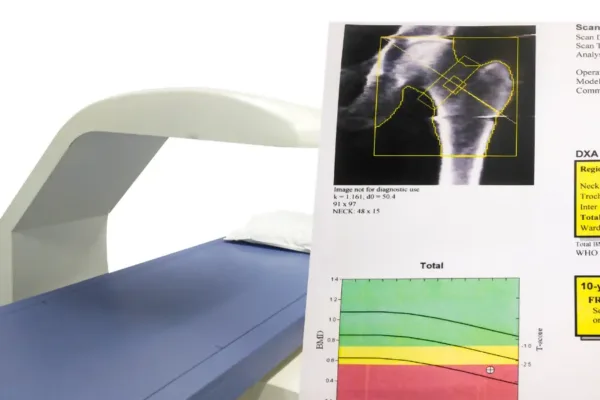- The Importance of Early Detection
- Who Should Get Screened for Osteoporosis?
- Risk Factors for Osteoporosis
- The DEXA Scan: A Painless and Effective Tool
- Taking Charge of Your Bone Health
As women age, they become increasingly susceptible to a debilitating condition called osteoporosis. This bone-thinning disease silently weakens bones over time, making them more fragile and prone to painful and potentially devastating fractures, especially in the spine, hip, and wrist.
Osteoporosis is more common in women, especially after menopause. Statistics show that between 13% and 18% of U.S. women over 50 have osteoporosis, with another 37% to 50% having low bone mass, a precursor condition known as osteopenia. These conditions can have a significant impact on quality of life, causing chronic pain, loss of height, stooped posture, and difficulty performing everyday tasks.
The Importance of Early Detection
The good news is that the serious complications of osteoporosis are largely preventable through early detection and proper treatment. A simple, painless bone density test called a DEXA scan can identify low bone mass before it progresses to full-blown osteoporosis. This allows your healthcare provider to recommend appropriate interventions to help maintain bone strength and prevent future fractures.
Who Should Get Screened for Osteoporosis?
 The National Osteoporosis Foundation recommends that all women over the age of 65, as well as younger postmenopausal women with one or more risk factors, undergo regular bone density screening. This includes women who have:
The National Osteoporosis Foundation recommends that all women over the age of 65, as well as younger postmenopausal women with one or more risk factors, undergo regular bone density screening. This includes women who have:
- Previously broken a bone as an adult, especially in the hip, spine, or wrist
- A close relative with osteoporosis
- Certain medical conditions like rheumatoid arthritis, thyroid disorders, or dementia
- Lifestyle factors like poor nutrition, smoking, excessive alcohol use, or lack of weight-bearing exercise
Risk Factors for Osteoporosis
In addition to age and gender, several other factors can increase a woman’s risk of developing osteoporosis. These include:
- Ethnicity (Caucasian and Asian women are at higher risk)
- Low body weight
- Hormonal changes, particularly estrogen deficiency after menopause
- Use of certain medications, such as long-term corticosteroids
The DEXA Scan: A Painless and Effective Tool
 A DEXA scan, also known as dual-energy X-ray absorptiometry, is the gold standard for measuring bone mineral density. This quick, non-invasive test uses low-dose X-rays to assess the strength and density of your bones. It’s the best way to detect osteoporosis or osteopenia before a fracture occurs.
A DEXA scan, also known as dual-energy X-ray absorptiometry, is the gold standard for measuring bone mineral density. This quick, non-invasive test uses low-dose X-rays to assess the strength and density of your bones. It’s the best way to detect osteoporosis or osteopenia before a fracture occurs.
Women First offers in-office DEXA scans for your convenience. By getting screened and taking preventative measures, you can maintain strong and healthy bones throughout your life.
Taking Charge of Your Bone Health
If you’re concerned about osteoporosis or have any of the risk factors listed above, schedule an appointment with Women First to discuss your bone health. We can provide you with a personalized screening plan and guide you towards the best course of action for maintaining strong bones and preventing future health complications.
Remember, early detection is key to preventing the serious consequences of osteoporosis. Take control of your bone health – schedule your DEXA scan today.
